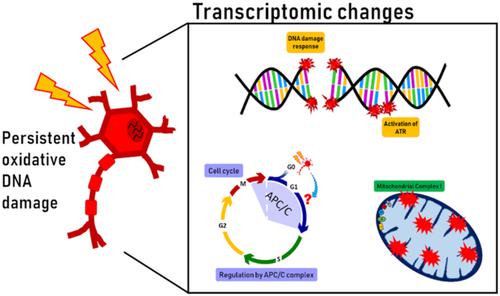当前位置:
X-MOL 学术
›
Eur. J. Nerosci.
›
论文详情
Our official English website, www.x-mol.net, welcomes your feedback! (Note: you will need to create a separate account there.)
Persistent DNA damage alters the neuronal transcriptome suggesting cell cycle dysregulation and altered mitochondrial function
European Journal of Neroscience ( IF 3.4 ) Pub Date : 2021-09-18 , DOI: 10.1111/ejn.15466 Irina Vazquez‐Villasenor 1 , Claire J. Garwood 1 , Julie E. Simpson 1 , Paul R. Heath 1 , Heather Mortiboys 1 , Stephen B. Wharton 1
European Journal of Neroscience ( IF 3.4 ) Pub Date : 2021-09-18 , DOI: 10.1111/ejn.15466 Irina Vazquez‐Villasenor 1 , Claire J. Garwood 1 , Julie E. Simpson 1 , Paul R. Heath 1 , Heather Mortiboys 1 , Stephen B. Wharton 1
Affiliation

|
Oxidative DNA damage induces changes in the neuronal cell cycle and activates a DNA damage response (DDR) to promote repair, but these processes may be altered under a chronic oxidative environment, leading to the accumulation of unrepaired DNA damage and continued activation of a DDR. Failure to repair DNA damage can lead to apoptosis or senescence, which is characterized by a permanent cell cycle arrest. Increased oxidative stress and accumulation of oxidative DNA damage are features of brain ageing and neurodegeneration, but the effects of persistent DNA damage in neurons are not well characterized. We developed a model of persistent oxidative DNA damage in immortalized post-mitotic neurons in vitro by exposing them to a sublethal concentration of hydrogen peroxide following a ‘double stress’ protocol and performed a detailed characterization of the neuronal transcriptome using microarray analysis. Persistent DNA damage significantly altered the expression of genes involved in cell cycle regulation, DDR and repair mechanisms, and mitochondrial function, suggesting an active DDR response to replication stress and alterations in mitochondrial electron transport chain. Quantitative polymerase chain reaction (qPCR) and functional validation experiments confirmed hyperactivation of mitochondrial Complex I in response to persistent DNA damage. These changes in response to persistent oxidative DNA damage may lead to further oxidative stress, contributing to neuronal dysfunction and ultimately neurodegeneration.
中文翻译:

持续的 DNA 损伤改变神经元转录组,表明细胞周期失调和线粒体功能改变
氧化性 DNA 损伤诱导神经元细胞周期的变化并激活 DNA 损伤反应 (DDR) 以促进修复,但这些过程可能在慢性氧化环境下发生改变,导致未修复的 DNA 损伤的积累和 DDR 的持续激活。未能修复 DNA 损伤会导致细胞凋亡或衰老,其特征是细胞周期永久停滞。氧化应激增加和氧化性 DNA 损伤的积累是脑衰老和神经变性的特征,但持续性 DNA 损伤对神经元的影响尚未得到很好的表征。我们通过按照“双重压力”方案将它们暴露于亚致死浓度的过氧化氢,在体外开发了永生化有丝分裂后神经元中持续氧化 DNA 损伤的模型,并使用微阵列分析对神经元转录组进行了详细表征。持续的 DNA 损伤显着改变了参与细胞周期调节、DDR 和修复机制以及线粒体功能的基因的表达,表明 DDR 对复制应激和线粒体电子传递链的改变有积极的反应。定量聚合酶链反应 (qPCR) 和功能验证实验证实了线粒体复合物 I 的过度激活以响应持续的 DNA 损伤。这些响应持续氧化性 DNA 损伤的变化可能导致进一步的氧化应激,
更新日期:2021-11-10
中文翻译:

持续的 DNA 损伤改变神经元转录组,表明细胞周期失调和线粒体功能改变
氧化性 DNA 损伤诱导神经元细胞周期的变化并激活 DNA 损伤反应 (DDR) 以促进修复,但这些过程可能在慢性氧化环境下发生改变,导致未修复的 DNA 损伤的积累和 DDR 的持续激活。未能修复 DNA 损伤会导致细胞凋亡或衰老,其特征是细胞周期永久停滞。氧化应激增加和氧化性 DNA 损伤的积累是脑衰老和神经变性的特征,但持续性 DNA 损伤对神经元的影响尚未得到很好的表征。我们通过按照“双重压力”方案将它们暴露于亚致死浓度的过氧化氢,在体外开发了永生化有丝分裂后神经元中持续氧化 DNA 损伤的模型,并使用微阵列分析对神经元转录组进行了详细表征。持续的 DNA 损伤显着改变了参与细胞周期调节、DDR 和修复机制以及线粒体功能的基因的表达,表明 DDR 对复制应激和线粒体电子传递链的改变有积极的反应。定量聚合酶链反应 (qPCR) 和功能验证实验证实了线粒体复合物 I 的过度激活以响应持续的 DNA 损伤。这些响应持续氧化性 DNA 损伤的变化可能导致进一步的氧化应激,


























 京公网安备 11010802027423号
京公网安备 11010802027423号